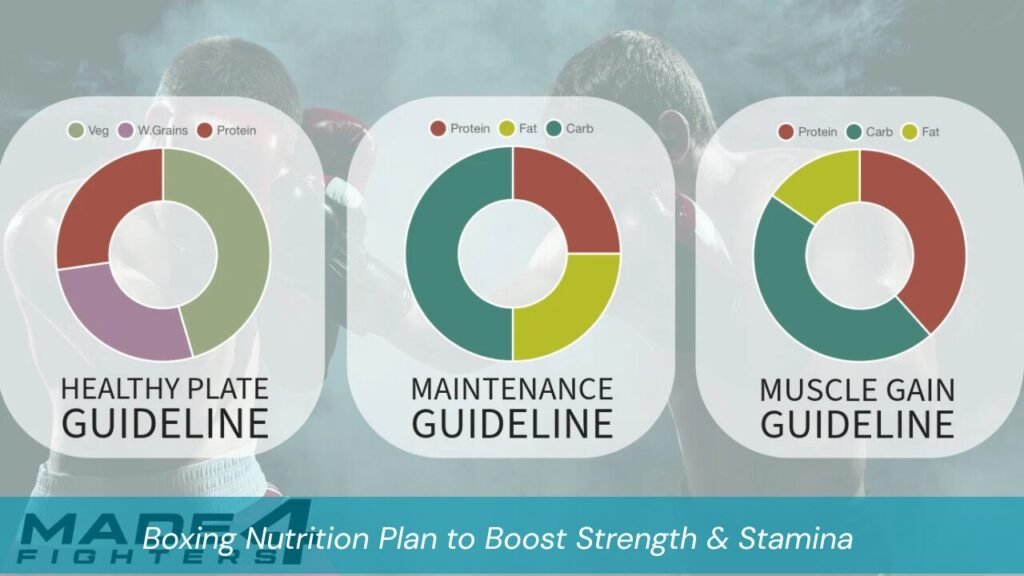A well-structured boxing nutrition plan can make the difference between an average fighter and a champion. Boxing is one of the most physically and mentally demanding sports, requiring an extraordinary balance of endurance, explosive power, agility, and focus. While countless hours in the gym sharpen a boxer’s skills, it is nutrition that ultimately fuels the training sessions, speeds up recovery, and determines how strong and energetic a fighter feels when they step into the ring.
Without proper nutrition, even the most skilled athlete can underperform. A boxer who eats poorly may find themselves drained of energy, struggling to make weight, or unable to recover properly after grueling workouts. On the other hand, a fighter who follows a well-structured nutrition plan can train harder, stay sharp, recover faster, and fight with confidence. In this comprehensive guide, we will explore the foundations of an effective boxing nutrition plan, provide a full seven-day sample meal structure, discuss hydration strategies, and answer the most frequently asked questions.
Key Takeaways
- Proper nutrition fuels training, enhances recovery, and maintains energy for peak boxing performance.
- Balanced intake of carbohydrates, protein, and healthy fats is essential for endurance, strength, and mental focus.
- Hydration and electrolyte management significantly affect reaction time, endurance, and overall performance.
- Structured meal planning supports weight management, muscle building, and long-term consistency for fighters.
Why Nutrition Matters in Boxing
Nutrition plays a crucial role in every sport, but in boxing it is particularly vital because of the intensity of training and the importance of maintaining weight within strict divisions. A boxer’s body must withstand high-volume cardio sessions, heavy bag drills, sparring rounds, and strength training. This level of exertion burns thousands of calories, and failing to replenish properly can lead to fatigue, muscle breakdown, and poor concentration.
When a boxer eats well, their energy levels remain stable throughout training sessions. This allows them to push through the final rounds of sparring or conditioning without feeling sluggish. A proper diet also ensures faster recovery, which is critical because boxers often train multiple times per day. With the right balance of macronutrients and micronutrients, muscle soreness is reduced, joints remain healthier, and injuries are less likely to occur.
Another major benefit of following a proper boxing nutrition plan is weight management. Fighters are required to make weight before competition, which means carefully balancing calorie intake and expenditure. A poorly designed diet can cause a boxer to lose muscle mass instead of fat, leaving them weak on fight night. Conversely, a smart plan allows a fighter to cut weight strategically while maintaining strength and explosiveness.
Finally, nutrition has a direct impact on mental sharpness. Glucose, derived from carbohydrates, is the brain’s primary energy source. If a fighter is under-fueled, they may feel sluggish, have slower reaction times, and struggle to stay focused in the ring. Proper nutrition helps ensure mental clarity and the quick decision-making required for success in boxing.
The Core Elements of a Boxing Nutrition Plan
At the heart of any effective boxing nutrition plan is the balance between three macronutrients carbohydrates, protein, and fat. Each plays a distinct role, and together they provide the fuel and building blocks needed for peak performance.
Carbohydrates are the body’s primary energy source and are especially important for boxers, who engage in high-intensity training. Complex carbohydrates such as oats, quinoa, brown rice, and sweet potatoes provide steady energy over long periods, making them ideal for pre-training meals. Simple carbohydrates, such as fruit or honey, are rapidly absorbed and can be used immediately after workouts to replenish glycogen stores. A boxer who neglects carbs risks running out of energy midway through training, which can compromise performance.
Protein serves as the body’s repair mechanism. Every punch thrown in sparring, every push-up, and every weightlifting session creates tiny tears in muscle fibers. Protein provides the amino acids necessary to repair and strengthen those fibers, leading to muscle growth and improved endurance. Lean protein sources such as chicken, fish, eggs, and Greek yogurt are excellent staples. Many boxers also supplement with whey protein for convenience, especially after training sessions when the body needs immediate recovery fuel.
Healthy fats, though often overlooked, are equally important. Fats are essential for long-term energy, hormone regulation, and joint health. Boxers who consume avocados, olive oil, nuts, and fatty fish benefit from improved endurance and better absorption of fat-soluble vitamins like A, D, E, and K. Unlike simple sugars, which burn out quickly, fats provide steady energy reserves that can be invaluable during long sparring sessions or when a fight goes the distance.
Structuring a 7-Day Boxing Nutrition Plan
To better understand how these macronutrients come together in practice, let’s outline a sample seven-day boxing nutrition plan. This plan is designed for a fighter training at a moderate to high intensity, though portion sizes should be adjusted depending on the individual’s weight class and specific energy needs.
On the first day, a strong breakfast of oatmeal topped with banana, peanut butter, and chia seeds provides a blend of slow-digesting carbohydrates, healthy fats, and fiber. This sets the stage for sustained energy throughout the morning. A mid-morning snack of Greek yogurt with berries introduces protein and antioxidants, helping with muscle repair while boosting immunity. Lunch might include grilled chicken, quinoa, and steamed broccoli—a meal rich in lean protein, complex carbs, and micronutrients. Before training, a light snack such as rice cakes with almond butter and a drizzle of honey offers fast energy without feeling heavy. Dinner could consist of baked salmon, roasted sweet potatoes, and spinach, providing omega-3 fats, complex carbs, and essential vitamins. Finally, a post-training protein shake ensures rapid muscle recovery.
As the week progresses, variety becomes essential to avoid dietary boredom and to ensure a wide spectrum of nutrients. For example, breakfast can rotate between scrambled eggs with whole-grain toast and avocado, or a smoothie with spinach, berries, and whey protein. Lunches can alternate between lean beef stir-fry with brown rice and turkey wraps with whole-wheat tortillas. Dinners might include shrimp with quinoa and vegetables or a vegetable omelet paired with roasted potatoes. By incorporating different proteins, vegetables, and whole grains, fighters ensure they receive a balance of vitamins, minerals, and amino acids.
This seven-day framework not only fuels training but also establishes consistency. A fighter who eats clean and balanced meals every day avoids the pitfalls of last-minute, unhealthy food choices that can undermine progress.
Hydration The Forgotten Secret Weapon
Many fighters focus on food but underestimate hydration. Dehydration, even at mild levels, can dramatically reduce performance. Studies show that losing just two percent of body water can impair cognitive function, reaction time, and endurance—factors that are critical in boxing.
A boxer’s hydration strategy should involve drinking at least two to three liters of water daily, more if training sessions are particularly intense or conducted in hot environments. Electrolytes are also crucial, especially after heavy sweating. Drinks that provide sodium, potassium, and magnesium help restore balance and prevent cramping. While caffeine in small amounts can improve focus, excessive consumption or reliance on energy drinks can be detrimental, as they deplete hydration and can cause crashes in energy levels.
Balancing Cutting Weight and Building Strength
Boxers often face the dual challenge of making weight while still maintaining strength and performance. The approach depends on whether the goal is to cut weight before a fight or to build muscle and power during the off-season.
When cutting weight, boxers typically reduce carbohydrate intake slightly, increase vegetables, and closely monitor sodium levels to avoid excess water retention. However, extreme cutting should be avoided, as it can lead to fatigue, dizziness, and decreased performance on fight night. The smartest fighters make gradual adjustments and use rehydration and refueling strategies after weigh-ins to restore strength.
When the goal is building strength, the approach shifts to a slight calorie surplus with an emphasis on higher protein intake. Resistance training is paired with increased consumption of lean meats, dairy, and plant-based proteins. This ensures muscle mass grows steadily without unnecessary fat gain.
Real World Example
Olympic gold medalist Vasyl Lomachenko credits his success not only to intense training but also to strict nutrition and hydration practices. His diet includes lean proteins, complex carbs, and healthy fats, with carefully timed meals around workouts. This disciplined approach supports recovery, maintains strength, and keeps his mental sharpness at peak levels, demonstrating the real impact of a well-structured boxing nutrition plan in elite performance.
Expert Tips for Long-Term Success
Succeeding with a boxing nutrition plan requires more than knowing what to eat. It demands consistency and discipline. Many fighters find it helpful to plan meals ahead of time to avoid grabbing fast food out of convenience. Keeping healthy snacks like fruit, nuts, or protein bars readily available ensures that hunger doesn’t derail progress.
Tracking progress is equally important. Instead of obsessing over scale weight alone, fighters should monitor body composition, strength levels, and energy during training. This holistic approach gives a clearer picture of whether the nutrition plan is truly working.
Some boxers benefit from supplements, though these should be chosen carefully and used only when necessary. Creatine may improve strength and recovery, omega-3s support joint health, and branched-chain amino acids (BCAAs) may help reduce muscle breakdown during intense training. However, whole foods should always remain the foundation of a boxer’s diet.
For further reading, you can explore this nutrition guide for athletes, which provides additional science-backed insights into performance-based eating.
FAQs
What should a boxer eat before a fight?
A boxer should consume a meal rich in complex carbohydrates with a moderate amount of lean protein and very little fat about three to four hours before a fight. Examples include brown rice with grilled chicken and vegetables or oatmeal with fruit and eggs. This combination provides long-lasting energy without causing digestive discomfort.
Is protein powder necessary for boxers?
Protein powder is not a necessity, but it is a convenient way to ensure adequate protein intake, especially after training. Whole food sources should always come first, but whey protein shakes are effective for quick recovery when a full meal is not immediately available.
How many calories does a boxer need?
Caloric needs vary widely based on weight class, training intensity, and goals. On average, male fighters may need between 2,500 and 3,500 calories per day, while female fighters might require 1,800 to 2,500 calories. The best way to determine the correct intake is to track training output, weight fluctuations, and energy levels.
Can boxers eat cheat meals?
Cheat meals are acceptable in moderation. One indulgence will not ruin a diet, but consistency matters far more than perfection. Boxers should use cheat meals as occasional rewards rather than regular habits.
Should boxers avoid carbs when cutting weight?
Carbohydrates should not be eliminated entirely, even when cutting weight. They are essential for energy and performance. Instead, boxers should adjust the timing and portion sizes of carbs, focusing on consuming them earlier in the day or around training sessions.
Conclusion
A carefully designed boxing nutrition plan is one of the most powerful tools a fighter can use to maximize performance. By prioritizing balanced meals with the right mix of carbohydrates, protein, and fats, staying well-hydrated, and adopting smart strategies for either cutting weight or building strength, boxers give themselves a critical edge. Nutrition is not about short-term fixes; it is about building sustainable habits that support years of training and competition.
If you are serious about your boxing journey, begin by making small changes. Swap processed foods for whole, nutrient-dense meals, stay consistent with hydration, and track how your body responds. Over time, these small habits add up to big results. Champions are not only made in the gym but also in the kitchen and the fuel you choose today can define your performance tomorrow.




